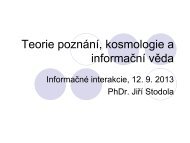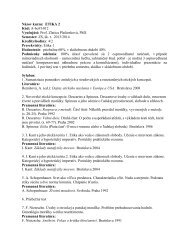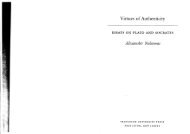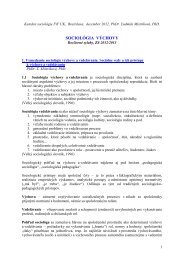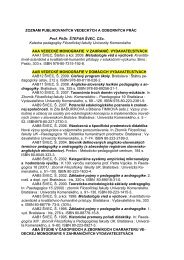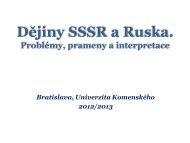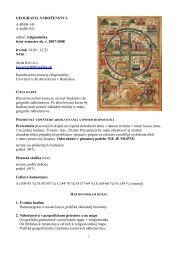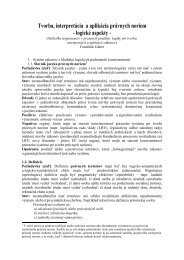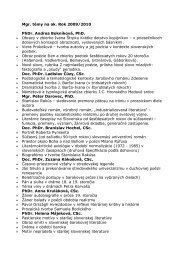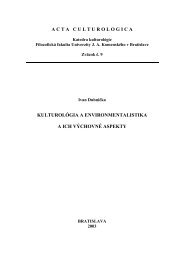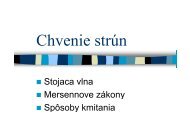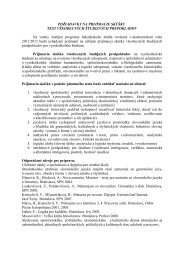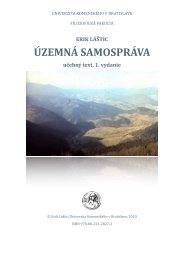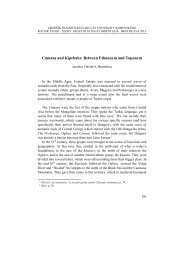You also want an ePaper? Increase the reach of your titles
YUMPU automatically turns print PDFs into web optimized ePapers that Google loves.
110 LEXICAL MEA ING<br />
or antonym for different en es. For instance, when using the 'ternperature'<br />
en se of hot, it oppo ite i cold. but when u ing the' picy' en e of hot, its<br />
opposite is mild. For thi rea on, ernantic relation are ometimes called sense<br />
<strong>relations</strong>.<br />
6.2.2 Synonymy<br />
The term synonym come from Greek roots syn 'alike' <strong>and</strong> onym<br />
'name.' It refer to word that mean the ame as each other, o the equal sign =<br />
is used to signal synonymy. Becau e it i rare for two word to have exactly the<br />
same rneaning/u e, discussions of ynonymy frequently concern word that are<br />
not perfect synonym , but that differ only slightly. The substitutability test is<br />
u ed to determine whether two words are synonym . Word are ub titutable if<br />
there is no change in the mean ing of a sentence when one word is ubstituted<br />
for the other. So, for example, if the truth of (3) entails the truth of (4), <strong>and</strong> vice<br />
ver a, then we have evidence that person <strong>and</strong> human are synonyrn<br />
(3) A per on is st<strong>and</strong>ing beside me.<br />
(4) A human is t<strong>and</strong>ing be ide me.<br />
If we want to te t whether man is a ynonyrn for per on, then we can compare<br />
(5) <strong>and</strong> (3).<br />
(5) A man is t<strong>and</strong>ing be ide me.<br />
In thi case, ince we can conclude that ometime it would be true that a person<br />
is st<strong>and</strong>ing beside me at the ame time when it is fal e that a man is t<strong>and</strong>ing<br />
be ide me - since there things that can be referred to as person that can not be<br />
called man - namely, women, girls, <strong>and</strong> boy . Hence man <strong>and</strong> person are not<br />
ynonyms.<br />
Absolute vs. sense synonyms<br />
Words are said to be absolute syn ony ms if they are substitutable in any po sible<br />
context with no changes in denotation or other a pect of meaning (including<br />
connotation - see §2.2.2). U ing that criterion, it i ea y to see that very few<br />
word are ab olute ynonym . Take for example funny = peculiar <strong>and</strong> funny =<br />
comical. Where peculiar is substitutable for funny, as in (6), comical probably i<br />
not ub titutable <strong>and</strong> vice ver a, a in (7).<br />
(6) My turnrny feels a bit funny (= peculiar, 1comical) whenever l eat fish.<br />
(7) Anna told a hilariously funny (l peculiar, = comical) joke.<br />
Funny has different ynonym in different context beca u e it is polysemou ,<strong>and</strong><br />
its various en e match up semantically with different set of words. Since they<br />
do not share all their en se .funny <strong>and</strong> pecu/iar are not ab olute ynonym , <strong>and</strong><br />
neither are funny <strong>and</strong> comical. In tead, they are sense synonyms, in that they<br />
each have one sen e that mean the ame as one of the other word' en e .<br />
For each of the followingpa<br />
ynonyms by giving a enter<br />
Describe why they are not 1<br />
a. safe, ecure<br />
b. fake. false<br />
C. big, large<br />
d. (a tough one!) Ol<br />
The exi tence of large the:<br />
are very close in meaning. :<br />
to find pair that are perfectl<br />
may feel that funny <strong>and</strong> co,<br />
funny joke is a slightly diff<br />
(1973:12-13) has gone of.<br />
where two expres ion canr<br />
be deceiving our elve ." Tt<br />
technical names for thing<br />
furze = gorse = whin, whic<br />
American example i groutu<br />
leave it to you to decide wh,<br />
myself in claiming that the (<br />
Near-synonyms<br />
Far more common is for wo<br />
[ake ~ false in Puzzle 6-1.<br />
ynonyms (in a particular<br />
contexts, but not every conte)<br />
ub titution te t in (8), but fa<br />
have a sense that roughly me:<br />
are not shared by both word<br />
(8) Ian obtainedlacquir<br />
(9) a. Jan obtained permi<br />
b. Ian acquired a Briti!<br />
So far, we have seen that<br />
being poly emou in differer<br />
ynonym ) or by not having<br />
onyms that are denotationally<br />
way - for exarnple, by belo<br />
different connotations. So, w



